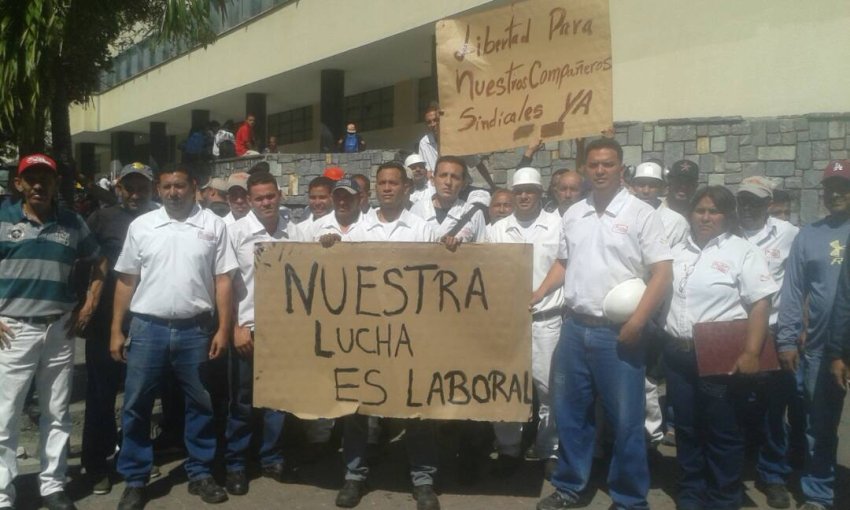
Venezuelan workers’ organisations have denounced illegal arrests, firings and persecution in the Lacteos Los Andes state-run dairy company and private Venevision TV station. Meanwhile, campesino (peasant) leaders in Barinas state were freed and authorised to return to their land after persecution by an ex-land owner.
Trade union leaders of the Lacteos Los Andes “Hugo Chavez” plant in Cabudare, Lara state, were arrested on February 1. The arrests came after peaceful protests by its workforce that aimed at drawing attention to what they say are inefficient and unproductive policies by management.
The plant was nationalised by then-president Hugo Chavez in 2008.
Protesters said the plant, which produces a range of dairy and fruit products, is operating at only about 20% capacity. Workers explained that output had dropped from 45,000 tonnes to just 5000 tonnes. The situation contributes to shortages in basic foodstuffs across Venezuela.
Workers on the picket lines drew attention to the fact that private firms in the same industry, such as Polar, El Tunal, and Procter & Gamble, enjoy preferential access to state dollars for raw material imports. Meanwhile, state-run productive units such as the Cabudare plant struggled to find enough raw materials for production.
Privatisation fears
Workers linked what they described as a lack of commitment from authorities to fears of a possible re-privatisation of the plant. This would put their jobs in jeopardy.
Worries that the current government is moving towards re-privatisating state-run firms has been reflected in greater involvement of the private sector in the state oil firm, PDVSA, and the putting up for sale of the nationalised supermarket chain Abastos Bicentenario in the past year.
Trade union representative Angel Manuel Medina said the protest was part of a national day of action on the part of Lacteos Los Andes workers. The state firm employs more than 6000 workers across the country, with 1850 located in Lara state.
Workers blocked a major highway on February 1 after local United Socialist Party of Venezuela (PSUV) Governor Carmen Melendez reportedly failed to receive a commission of the dairy workers. That evening, several trade union leaders were arrested.
Three arrested trade union leaders, Exio Urriola (president of the workers’ union), Carlos Mora (union general secretary) and Jimmy Merchan (complaints secretary), were subsequently released on February 7.
Venevision
Meanwhile, workers at the private right-leaning TV station Venevision have accused the parent company, the Cisneros Group, of carrying out what they term an “anti-worker offensive”. They say this has forced more than 3000 workers out of work.
“Currently, Venevision has 748 workers, which is the result of a deliberate policy of personnel reduction through persecution, siege, harassment and the systematic reduction in wages, in a firm that at one point had more than 4000 workers,” said a declaration signed by Venevision workers on February 1.
According to the statement, more than 2000 workers have been “pressured” to withdraw from the firm “in what has gone of 2018 alone”.
Representatives of the workforce further denounced the transfer of the station’s activities to its subsidiary company, Venevision Plus, as a cost-saving, anti-worker measure. Venevision Plus works with an automatised master control and requires only 200 workers.
The multinational Cisneros Group, whose owner Gustavo Cisneros is estimated to be worth US$1.4 billion, is accused of violating several laws in its treatment of workers.
The workers said they have raised their complaints with the Ministry of Labour and the labour inspectors, who are the competent authorities charged with overseeing such irregularities, but have yet to receive a response.
Campesinos released
Elsewhere, in Barinas state, the 2nd Municipal Court ordered that arrested farmers should be released and allowed to return to their land. On January 31, the Bolivarian National Guard (GNB) had detained more than 60 citizens and a school was destroyed.
Judge Osmar Pernia ruled that the Gavilan-La Chaqueta ranch was considered the campesinos’ place of residence and ordered the immediate return of their possessions, tools, agricultural machinery, vehicles and more than 400 cattle that had been confiscated by the GNB.
The 4312 hectares of the Gavilan-La Chaqueta Ranch is partially occupied by hundreds of campesinos organised into communal councils and social organisations. The occupation was legalised two years ago after the ranch had gone more than 20 years without producing.
Under Venezuela’s 2001 Land Law, large unproductive landholdings can be taken over by farmers willing to put them to use.
The ranch now produces 200 litres of milk a day, as well as rice, plantain and yucca.
Two of the campesino leaders, Alexander Soto and Wiston Olivera, remain behind bars due to a further accusation of cattle theft. The accusation was filed against them by the previous owner of the ranch, Manuel Mansilla, a large landowner in the region.
Community station Alba TV explains that such accusations are “common mechanisms used [by the large landowners] to criminalise campesino leaders”.
[Abridged from Venezuela Analysis.]
Like the article? Subscribe to Green Left now! You can also like us on Facebook and follow us on Twitter.